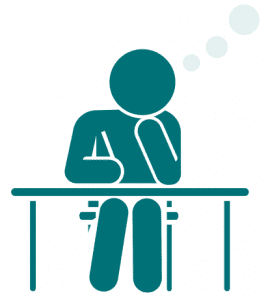The fatuous infatuation with well-being
 Further to a TES article “Schools should appoint heads of well-being, charity says“, I tracked back the report being cited… then the citation of the citation of the citation within it. Here’s what I found.
Further to a TES article “Schools should appoint heads of well-being, charity says“, I tracked back the report being cited… then the citation of the citation of the citation within it. Here’s what I found.
First of all, what is the TES doing uncritically reporting that “75% of mental illness is unreported”. What could that possibly mean? At best it is a projection, at worst it is guesswork. The actual survey cited says “About three-quarters of people with physical disorders receive treatment, while only about a quarter of people with mental disorders do so” actually refers to a global survey, mostly commenting on the lack of treatment in developing countries! It also labels “Panic Disorder”, “Specific Phobia” alongside children’s “Oppositional-Defiant Disorder” (eh?) and “Intermittent Explosive Disorder” (eh?) and “Pathological Gambling”.
Secondly, unlike the journalist, everyone should read this 2020Health Report. You will hopefully find that it is absolutely garbage: vindictive, patronising and Victorian.
Try these quotes:
“if the parents are eating unhealthy food and spending five hours in front of a screen a day, likely as not the children are also.” This is the stuff of 19th century patrician contempt for ordinary people: simply by hinting that watching TV is bad for you and simply implying – with a contemptuous wink – what is meant by “unhealthy food”.
Statistics on mental illness include: “one in five (20%) of girls in Year 11 (age 15/16) reporting anxiety or depression (which means) irregular sleep patterns, cyber bullying, social isolation, exam stress, confusion around sexuality, rejection, bereavement and family breakdown”. Mental illness? Really?
The report authors seem disappointed that obesity statistics in females fell from “26.7% in 2004, decreasing to 16.5% by 2011” and so they have simply moved the goalposts to report that “If the data on young teenage girls appears encouraging, we also need to bear in mind the apparent increase of eating disorders in recent years”. First create scares about food (or “unhealthy food”) and then blame them for not living up to it (eating disorders fueled, no doubt, by the bullying confusion about what to eat).
Having no data doesn’t even put these researchers off: “Reduced rates of smoking, alcohol consumption and drug misuse may be attributable in part to PSHE Education, but no corroborating (quantitative) data exists.”
The more that a well-being consultancy can make themselves into an essential part of our daily lives, with more clients, the better it is for their business. So we find them saying: “It is all too easy to turn health and well-being initiatives into tick-box exercises. This in turn creates a low-impact, fragmented school wellbeing programme, one liable to frustrate staff as a timewasting exercise that interferes with the business of raising educational outcomes… therefore, support for parent education in child wellbeing, alongside greater parental involvement in the school’s wellbeing initiatives, may well be part of the solution… (and) the regular measurement of children’s wellbeing.”
This report is worth looking at to come to terms with flabby science, undernourished journalism, unhealthy emphasis on bullshit evidence, and the disordered self-gratification of academia.






